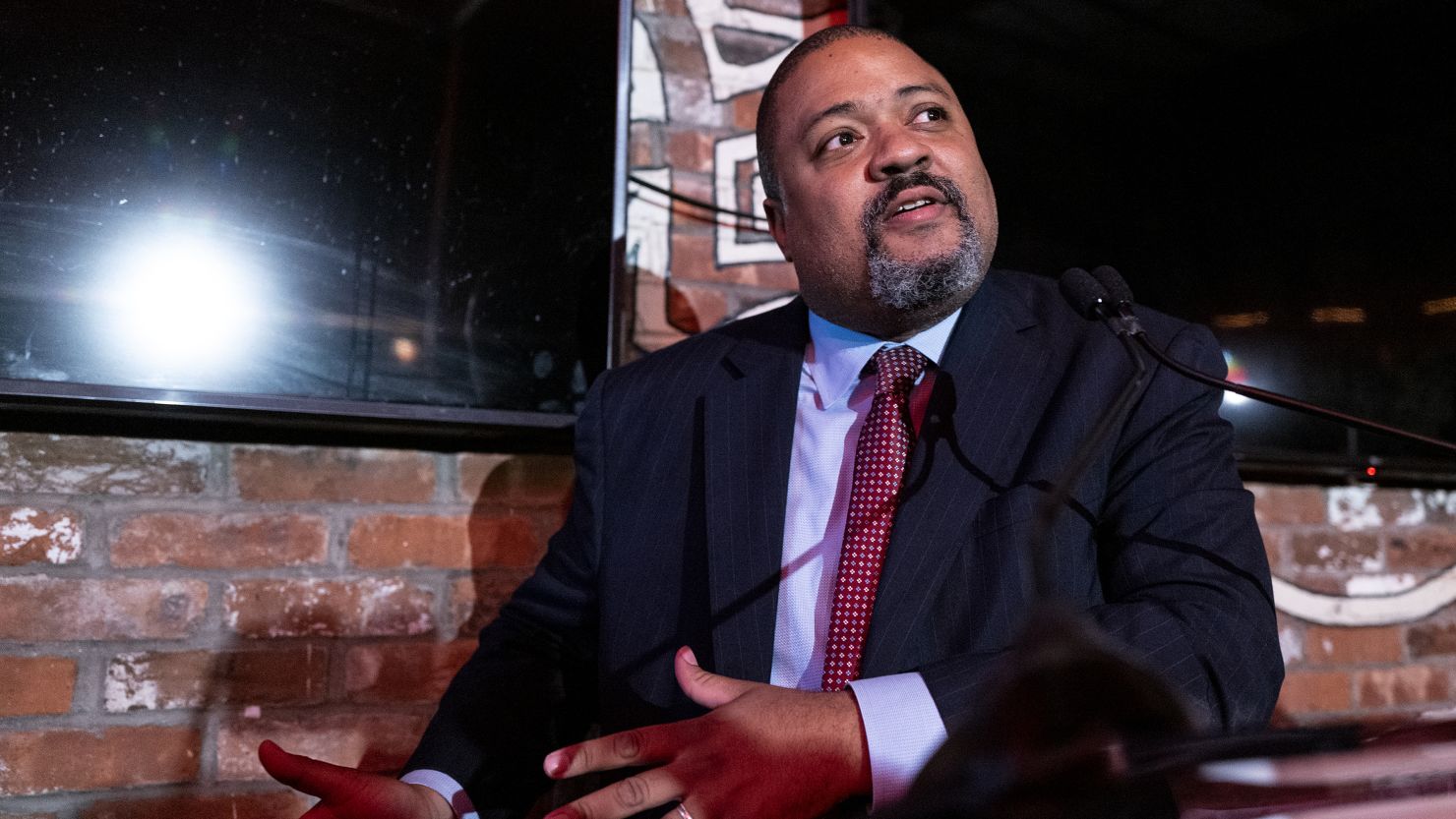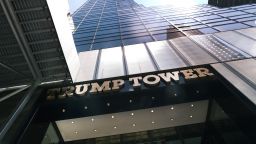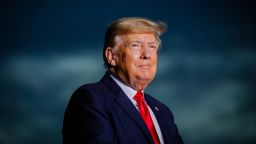The next Manhattan district attorney, Alvin Bragg Jr., says he plans to personally focus on the high-profile probe into former President Donald Trump’s business practices and may expand the investigative team while keeping at least one senior prosecutor on the case.
Bragg, who will be sworn into office on January 1, said he hasn’t been briefed on the facts of the Trump case, which is before a state grand jury. But he indicated he has no plans to disrupt the investigation he’s inheriting even as he also wants to focus on his own agenda.
“This is obviously a consequential case, one that merits the attention of the DA personally,” Bragg said in a recent interview over lunch in Harlem.
RELATED: Forbes writers questioned before Trump Organization grand jury
Carey Dunne, general counsel to the current District Attorney Cy Vance Jr. who argued successfully before the Supreme Court to get Trump’s taxes, has agreed to continue on the case, people familiar with his decision told CNN. Bragg said he would like Mark Pomerantz, a highly regarded attorney with deep knowledge of financial investigations who was recruited by Vance to steer with the investigation, to also stay.
“It’s hard for me to evaluate not knowing the facts, but just having worked on lots of investigations that are complex, I can say that you’ve got two very good lawyers that have been looking at it for a while. I think it would be a disservice to Manhattan to lose them,” Bragg said.
Bragg said he’s in the process of meeting with staff in his new office. While he will bring in his own executive-level advisers, the fact that some senior staffers who often leave with the change in administration are staying is significant.
“Carey and Mark have been doing this a long time,” he said. “I want to hear what they’re thinking. I’ll bring my experience to bear. I may add other people to the team.”
The investigation, which has been underway for several years, appears to be coming to a head with prosecutors focusing on the accuracy of the Trump Organization’s financial statements when seeking financing, people familiar with the matter have told CNN.
Prosecutors have begun bringing witnesses before the grand jury, including a key Trump accountant and two Forbes journalists. They have also recently interviewed employees from Deutsche Bank, one of Trump’s main lenders. The ongoing investigation follows criminal charges announced in July alleging the Trump Organization and its chief financial officer engaged in a 15-year tax fraud scheme. Trump Organization and the CFO, Allen Weisselberg, have pleaded not guilty.
The Trump investigation looms over the DA’s office as Bragg is set to make history as the first Black district attorney for New York County. He ran on a platform to shake-up the culture of the storied prosecutor office. He’s ascent comes during a national reckoning over police-involved shootings of unarmed men and rising gun violence in New York and other major American cities.
The Trump case could be an early test of how Bragg approaches the office.
The case has drawn criticism from Trump, who has called the investigation into his business politically motivated, while some Democrats have set high expectations that a criminal case will be made against the former President who has a Teflon reputation for shedding serious investigations.
Bragg, a former federal prosecutor, says even though the investigation involves a former president, he would apply “the analysis that we’ve always used, I’ve always used, in multiple offices.” He said that is: “Would you bring this case otherwise? That’s got to be the guiding light.”
Julian Moore, a former federal prosecutor who has known Bragg since they were students at Harvard University, said, “In the case of Mr. Trump before the DA’s office, I don’t see Alvin proceeding any differently than he has in the past, which means he will pursue the matter without fear or favor and seek even-handed justice for all those that deserve it.”
Moore added, “The way he’s conducted himself in life is to treat everyone fairly and to recognize no one is above the law, including the rich and powerful, including law enforcement.”
‘Day One’ plans
The risk to Bragg is that the investigation absorbs resources and distracts from his vision. Bragg has “Day One” plans to focus on reducing gun violence and addressing what he’s called a “humanitarian crisis” at Rikers, the long-troubled New York City jail.
He’s also announced plans to reimagine the sexual assault unit to make it more “survivor centered,” and he has spoken about applying justice more evenly with a desire to win the trust of various communities, including his own African American community.
Unlike his predecessors, Vance and Robert Morgenthau, whose fathers served in presidential administrations, Bragg’s experience growing up in Harlem in the 1980s gives him a different perspective. He often says many of his ideas come from personal experience: he’s had a gun pointed at him six times, three of them by police officers; his brother-in-law lived with him after he was incarcerated; his father ran homeless shelters.
Bragg says the twin issues facing the nation – reducing gun violence and police accountability – are two sides of the same coin.
Bragg said holding police officers accountable will help rebuild trust with the community, which will also help shore up public safety.
“I can tell you from public experience I had chapters in my life where the last thing we wanted to do was talk to police officers,” Bragg said. “These are your witnesses, these are your victims. I see them really as part of a cohesive administration of justice approach.”
“We need prosecutors. We need to address crime, but we don’t have to do it the way we’ve done it. There’s a way we can do it with community partnership. There’s a way we can do it where we are affirming the great work officers are doing but calling out the atrocities that happen, and that’s my reality,” Bragg added.
Vinoo Varghese, a criminal defense lawyer critical of the current approach on charging decisions that he contends is overly punitive, says Bragg “has a chance to make a difference.”
“It will be a tough challenge for him,” Varghese said. “People are nervous in this city, particularly in Manhattan. When he talks about being progressive, he’s got to balance that out with making people feel safe.”
Bragg’s mother was a math teacher and vice president for academic affairs at the Borough of Manhattan Community College. His father was active in civil rights causes and was a former director in Manhattan of the New York Urban League and ran homeless shelters for city government. Bragg attended Trinity School, a private school in Manhattan, before going on to Harvard University and Harvard Law School.
His professional focus has been in law enforcement, with positions in the New York attorney general’s office and the Manhattan US attorney’s office where he prosecuted an FBI agent for lying about a confidential informant, a state senator and NYC council member for bribery and corruption and a businessman who laundered millions of dollars through a perfume business for the Mexican Sinaloa drug cartel.
At the New York attorney general’s office, he was the first person to oversee and build a new unit to review police-involved shootings of unarmed citizens. He served as chief deputy attorney general under New York attorneys general Eric Schneiderman and then Barbara Underwood, who sued the Trump Foundation.
Bragg said he first began thinking about running for Manhattan district attorney more than two years ago when he was transitioning out of the attorney general’s office as the new administration, under Letitia James, took over.
Bragg takes over with new leadership across the city, including a new Mayor-elect Eric Adams, who was a New York City police officer and has discussed bringing back a controversial plainclothes police unit. Bragg says Adams has “talked about bringing it back in a revamped way, and I welcome that conversation to see what he means.”
Bragg says his office will re-evaluate the types of cases they decide to prosecute and the kinds of sentences they will seek – “Always asking that question, do we bring the case, does this advance public safety.” He says he’ll look for alternatives to incarceration, such as substance abuse treatment or mental health services when applicable, and says he wants to improve re-entry programs to reduce recidivism.
He’s also trying to correct “misinformation” spread on Twitter that he would not do undercover operations, a notion he called “ridiculous.” And he says some people have misinterpreted what he’s said about the kinds of cases he’d pursue to insinuate he wouldn’t charge someone who punched a police officer in the face.
“I’ve prosecuted assault cases, but we’re not going to do a case where the only charge is resisting arrest,” he said.
Bragg said he wants to shift from focusing on small-time gun sellers on street corners to dismantling large gun-trafficking operations.
“I think there’s gotta be building investigations around dismantling systems as opposed to looking around and it tends to be reduced to race,” Bragg said. “If you follow the contraband and follow the money, it will take you to the most culpable people and you hold them accountable.”
He takes over the office at when there are two new Black US attorney for Manhattan and Brooklyn, lawyers he knows, and a recently elected district attorney in Westchester County, Mimi Rocah, who Bragg worked with as a federal prosecutor. Rocah’s office is also investigating the Trump Organization and its golf course.
Bragg said it brings a familiarity that he hopes will help them all in their investigations.
Some friends of Bragg say the unresolved Trump investigation could distract energy and resources from his priorities, but Bragg says he’s no stranger to the pressures of high-stakes cases.
“I’ve done a lot of cases that are considered no-win,” he said. “I think going into most of those cases people were like, ‘Ooh, you’re gonna get a lot of heat however it comes out.’ That’s the job.”
He says there are always going to be critics and he has advised attorneys in the past to “embrace it. Do the right thing, put your head down and do the work.”
Bragg says, one of the first things he’ll do is assess the Trump investigation, and he’s realistic that some attorneys working on the case may leave. He said they’ll evaluate any pressing issues, such as statute of limitations as well as “softer” issues.
“Memories fade, evidence becomes less available,” he said, adding, “People on teams don’t always think about this: people leave offices and so if we do a case from the last five years, that turnover may hurt putting the case forward. All that’s gotta factor in.”
The investigation has been underway since 2018, and in July Vance announced state charges against the Trump Organization and Weisselberg for allegedly running a 15-year tax fraud scheme.
With two weeks left in Vance’s term, it’s not likely he will reach a charging decision as he had hoped, so the task will fall to Bragg.
“I’ve been involved in enough cases to know that the political calendar does not move around them nor should it,” said Bragg. “There’s one DA at a time.”



